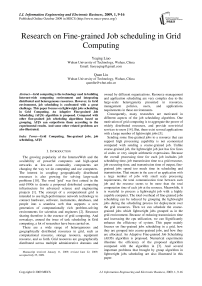Research on Fine-grained Job scheduling in Grid Computing
Автор: Yeqing Liao, Quan Liu
Журнал: International Journal of Information Engineering and Electronic Business(IJIEEB) @ijieeb
Статья в выпуске: 1 vol.1, 2009 года.
Бесплатный доступ
Grid computing is the technology used in building Internet-wide computing environment and integrating distributed and heterogeneous resources. However, in Grid environment, job scheduling is confronted with a great challenge. This paper focuses on lightweight jobs scheduling in Grid Computing. An Adaptive Fine-grained Job Scheduling (AFJS) algorithm is proposed. Compared with other fine-grained job scheduling algorithms based on grouping, AFJS can outperform them according to the experimental results. And some other related problems are also illustrated.
Grid Computing, fine-grained jobs, job scheduling, AFJS
Короткий адрес: https://sciup.org/15013034
IDR: 15013034
Список литературы Research on Fine-grained Job scheduling in Grid Computing
- I. Foster and C. Kesselman , “Globus: a metacomputing infrastructure toolkit,” International Journal of High Performance Computing Applications, vol. 2, pp. 115–128,1997.
- Chunlin Li, Layuan Li, and Zhengding Lu, “Utility driven dynamic resource allocation using competitive markets in computational grid”, Advances in Engineering Software,No.36, vol.6, pp.425–434, 2005.
- N. Muthuvelu, Junyan Liu, N.L.Soe, S.venugopal,A.Sulistio, and R.Buyya “A dynamic job grouping-based scheduling for deploying applications with fine-grained tasks on global grids,” in Proc of Australasian workshop on grid computing, vol. 4, pp. 41–48, 2005.
- R. Buyya, S. Chapin, and D. DiNucci, “Architectural models for resource management in the grid,” in Proc of the 1st IEEE/ACM International Workshop on Grid Computing, pp. 18-35, 2000.
- W. C. Chung and R. S.Chang, “A new mechanism for resource monitoring in grid computing,” Future Generation Computer System, Vol.25, pp.1-7, January 2009.
- R.Buyya and M.Murshed, “Gridsim: a toolkit for the modeling and simulation of distributed resource management and scheduling for grid computing,” Concurrency and Computation: Practice and Experience,vol. 14, pp. 1175–1220, 2002.
- X. S. He, X. H. Sun, and G. V. Laszewski, “Qos guided min-min heuristic for grid task scheduling,” Journal of Computer Science & Technology, vol.3, pp.442-451,2003.
- R. S. Chang, J. S. Chang, and P. S. Lin, “An ant algorithmfor balanced job scheduling in grids,” Future Generation Computer Systems, Vol.25, pp.20-27, January 2009.
- R.Buyya, “Economic model for resource management and scheduling in grid computing,” Concurrency and Computation: Practice and Experience, vol.14, pp.1507-1542, 2002.
- D. Fernández-Baca, “Allocating modules to processors in adistributed system,” IEEE Transactions on Software Engineering, pp.1427-1463, November 1989.
- V. Korkhov, T. Moscicki, and V.Krzhizhanovskaya,“Dynamic workload balancing of parallel applications with user-level scheduling on the grid,” Future Generation Computer Systems, vol.25, pp.28-34, January 2009.
- Gridbus Project website, http://www.gridbus.org/gridsim/
- M. Maheswaran, S. Ali, H. J. Siegel, D. Hensgen, and R.Freund, “Dynamic mapping of a class of independent tasks onto heterogenous computing systems,” in Proc of 8th IEEE Heterogeneous Computing Workshop (HCW’99), pp.30-44, San Juan, Puerto Rico, April 1999.
- F. Dong and S. G. Akl, “Scheduling algorithm for grid computing: state of the art and open problems,” Technical Report of the Open Issues in Grid Scheduling Workshop,School of Computing, University Kingston, Ontario,January 2006.
- Y. Gao, H. Rong, and J. Z. Huang, “Adaptive grid job scheduling with genetic algorithms,” Future Generation Computer Systems, vol.21, pp.151-161, January 2005.
- Quan Liu, Yeqing Liao, “A trust model based on subjective logic for multi-domains in grids,” in Proc of Pacific-Asia Workshop on Computational Intelligence and Industrial Application, vol.2, pp.882-886, 2008.
- Jon Bently, Programming Pearls, second edition,Addison-Wesley Inc., 2000.
- Foster. I and Kesselman C, The Grid: blueprint for a future computing infrastructure, Morgan Kaufmannn Publishers, USA, 1999.
- Liangxiu Han and Dave Berry, “Semantic-supported and agent-based decentralized grid resource discovery,” Future Generation Computer Systems, vol.24, pp.806-812,October 2008.
- R. Buyya, J. Giddy, and D. Abramson, “An Evaluation of economic-based resource trading and scheduling on computational power grids for parameter sweep applications,” The Second Workshop on Active Middleware Services (AMS 2000), 2000.
- E.Cody, R.Sharman, “Security in grid computing: A review and synthesis,” Decision Support Systems, vol. 44,pp.749-764, March 2008.
- M. Smith, M. Schmidt, “Secure on-demand grid computing,” Future Generation Computer Systems, vol.25,pp.315-325, March 2009.
- D. Laforenza, “Grid programming: some indications where we are headed,” Parallel Computing, vol.28, pp.1733-1752,Dec 2002.
- Junzhou Luo, Xudong Ni, Jianming Yong, “A trust degree based access control in grid environments,” Information Sciences, vol.179, pp.2618-2628, July 2009.
- G. Laccetti, G. Schmid, “A framework model for grid security,” Future Generation Computer Systems, vol.23,pp.702-713, June 2007.


